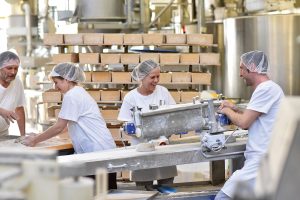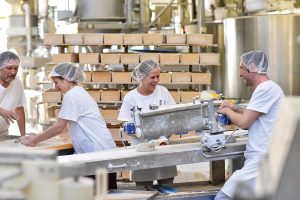
Job details
Location: Brampton, ON
Salary: CA$33K-CA$108K (Employer EST.)
Job type: Full Time , Part time
Shift/Hours: Morning, night, overnight
Position Overview:
A Production Helper works in a fast paced, dynamic bakery environment. This position is relied upon learn a variety of duties quickly and to adapt to frequent changes that occur on the production line.
Essential Job Functions (required duties and responsibilities):
- Operate tray wash, tray stacker, pan stacker/unstacker and aligner equipment
- Ensure the integrity and sustained certification of the food safety and food quality system.
- Responsible for reporting and taking any necessary action to prevent food safety and food quality issues from occurring.
- Stack and unstack pans from the production line.
- Load and unload pans from the production line.
Other duties as assigned. - Follow all GMPs, Personal Safety, Food Safety, HACCP, and SQF Rules. Adheres to the Baldinger Code of Conduct.
- Role model behaviors that display teamwork, respect, professionalism and that also reflect the Vision and Mission of Baldinger Bakery.
- Demonstrates the willingness to learn as part of the organization’s continuous improvement process.
- Works in a safe manner and promptly reports hazards identified in the work environment.
Education and Experience/Knowledge Requirements
- Manufacturing and/or baking experience preferred.
- High School graduate or its equivalency in experience and/or training.
- Ability to do basic math and computation skills as well as possess verbal and written skills.
Physical Demands:
Must be able to safely:
- Stand, stoop, bend and crouch on a regular basis.
- Lift 50 pounds on a continuous basis.
- Push and/or pull wheeled carts of 100-300 pounds on a regular basis.
- Sweep, mop, and do general wipe-down and Machine cleaning per SSOPs.
- Clean in Place the loop.
- Climb stairs and/or ladders.
Benefits
- Company pension
- Dental care
- Disability insurance
- Employee assistance program
- Extended health care
- Life insurance
- Paid time off
- Wellness program
Additional Information:
Essential position functions and education and experience are representative of the minimum levels of education, experience and knowledge required to perform the vital duties of this position. The position description does not constitute a written or implied contract of employment. Baldinger Bakery reserves the right to revise or change essential position functions and/or required duties and responsibilities as the need arises.
We are an Equal Opportunity Employer and do not discriminate against any employee or applicant for employment because of race, color, sex, age, national origin, religion, sexual orientation, gender identity, status as a veteran, and basis of disability or any other federal, state or local protected class.
We are proud to offer competitive compensation and benefit programs that include extended health, dental, pension plan, employee assistance program, wellness programs, life insurance, accidental death & dismemberment insurance, disability insurance, paramedical services, employee referral program, paid time off, and more!
For additional information about our company, go to
www.chg.com
Nous sommes fiers d’offrir une rémunération concurrentielle et des programmes d’avantages sociaux qui comprennent l’assurance-maladie complémentaire, l’assurance dentaire, le régime de retraite, le programme d’aide aux employés, les programmes de bien-être, l’assurance-vie, l’assurance en cas de décès ou de mutilation par accident, l’assurance-invalidité, les services paramédicaux, le programme de recommandation des employés, les congés payés, et plus encore !
Pour plus d’informations sur notre entreprise, rendez-vous sur
www.chg.com
What skills and qualities are important for a Production Packager?
A Production Packager plays a crucial role in preparing products for distribution by ensuring they are packaged, labeled, and organized correctly. This role requires attention to detail, efficiency, and adherence to quality standards. Here are important skills and qualities for a Production Packager:
1. Attention to Detail:
– Precise attention to detail is essential to ensure products are packaged accurately and according to specifications.
– Thoroughly checking labels, quantities, and packaging materials helps prevent errors and maintain product quality.
2. Manual Dexterity:
– Proficiency in handling packaging equipment, tools, and materials is vital for efficient and safe packaging processes.
– Good hand-eye coordination ensures products are packaged neatly and securely.
3. Time Management:
– Efficiently packaging products according to production schedules helps maintain workflow and meet distribution deadlines.
– Managing time effectively helps balance speed and accuracy.
4. Quality Control:
– Ensuring that products are packaged in a consistent and high-quality manner helps maintain the company’s reputation and customer satisfaction.
– Identifying defects, inconsistencies, or packaging errors is essential for preventing faulty products from reaching customers.
5. Organizational Skills:
– Properly organizing packaging materials, labeling, and finished products minimizes confusion and streamlines the packaging process.
– Being able to locate and access materials efficiently speeds up production.
6. Physical Stamina:
– Packaging work often involves repetitive motions and standing for extended periods. Physical endurance is important for maintaining productivity and avoiding fatigue.
7. Communication:
– Clear communication with supervisors and team members is important to ensure that packaging requirements and specifications are understood and met.
8. Problem-Solving:
– Being able to identify issues with packaging equipment, materials, or processes and finding solutions is essential for smooth operations.
9. Adaptability:
– Production packaging environments can experience changes in demand or product types. Being adaptable helps in transitioning between different packaging tasks effectively.
10. Health and Safety Awareness:
– Understanding and following safety protocols when using packaging equipment, handling materials, and working in the packaging area is crucial for personal safety and preventing accidents.
11. Teamwork:
– Collaboration with other team members, such as quality control personnel, supervisors, and machine operators, ensures a cohesive and efficient production process.
12. Basic Math Skills:
– Some packaging tasks may involve counting and basic measurements, so having a fundamental understanding of math is beneficial.
13. Attention to Hygiene:
– Maintaining cleanliness and hygiene when packaging products, especially in industries involving food or pharmaceuticals, is essential for product safety.
14. Positive Attitude:
– Having a positive attitude and a willingness to contribute to the team’s success creates a more pleasant work environment and promotes productivity.
15. Efficiency and Speed:
– While maintaining quality, being able to package products efficiently helps meet production targets and ensures timely delivery to customers.
A Production Packager’s role is pivotal in the production process, as they are responsible for ensuring that products are packaged correctly, efficiently, and to high quality standards before they reach consumers or clients.
Who can apply to this job?
The employer accepts applications from:
- Canadian citizens and permanent or temporary residents of Canada.
- Other candidates with or without a valid Canadian work permit.
How to apply
Online: Apply On Company WebSite
What education and certification are required to become a Production Packager?
Becoming a Production Packager typically does not require extensive formal education or certifications. However, certain skills and knowledge can enhance your qualifications for the role. Here are the common educational paths and certifications that can be beneficial:
Education:
- High School Diploma or Equivalent: Most Production Packager positions require a high school diploma or its equivalent. This provides a basic level of education and demonstrates essential skills in reading, writing, and basic math.
- Associate’s Degree or Technical Diploma: While not always required, obtaining an associate’s degree or a technical diploma in areas such as packaging technology, supply chain management, or a related field can provide a deeper understanding of packaging processes and materials. This could make you a more competitive candidate and potentially open doors for advancement within the industry.
Certifications:
Certifications are less common for Production Packager roles compared to other professions, but there are a few options that could enhance your qualifications:
- Certified Packaging Professional (CPP): Offered by the Institute of Packaging Professionals (IoPP), this certification is designed for packaging professionals and covers various aspects of packaging design, materials, regulations, and sustainability. While more relevant for packaging design and management roles, having this certification can showcase a commitment to the packaging field.
- OSHA Certification: While not specific to packaging, obtaining Occupational Safety and Health Administration (OSHA) certification can demonstrate your understanding of workplace safety regulations, which is important in a production environment.
- Forklift Operator Certification: If your role involves operating forklifts or other material handling equipment, obtaining a forklift operator certification can be necessary for safety and compliance reasons.
It’s important to note that while education and certifications can certainly enhance your qualifications, practical skills, work experience, and a strong work ethic are often equally if not more important for success in a Production Packager role. Many employers provide on-the-job training to ensure that employees understand specific packaging processes, equipment, and quality standards.
If you’re interested in pursuing a Production Packager role, you can start by looking for entry-level positions in manufacturing or production facilities. Tailoring your resume to highlight any relevant experience, skills, or coursework can help you stand out to potential employers.
What is the work environment like for Production Packager?
The work environment for a Production Packager can vary depending on the industry, the type of products being packaged, and the specific company’s practices. However, there are some common characteristics that you can expect in a typical work environment for a Production Packager:
1. Production Floor: Production Packagers primarily work on the production floor or in designated packaging areas. This is where they perform packaging tasks, such as assembling products, placing them in packaging materials, sealing containers, and applying labels.
2. Fast-Paced Atmosphere: Production packaging is often carried out in a fast-paced environment, especially in industries where high volumes of products need to be packaged quickly. Meeting production targets and deadlines is essential.
3. Repetitive Tasks: Packagers often engage in repetitive tasks, such as placing items in containers, sealing packages, or labeling products. The ability to maintain focus and attention to detail during repetitive tasks is crucial to ensure accurate and consistent packaging.
4. Shift Work: Many production facilities operate on multiple shifts to maintain continuous production. As a result, Production Packagers might need to work during various shifts, including evenings, nights, weekends, and holidays.
5. Team Collaboration: Packaging is often part of a larger production process, involving coordination with other team members. This could include communication with machine operators, quality control personnel, supervisors, and other members of the production team.
6. Safety Emphasis: Safety is a significant concern in a production environment. Adhering to safety protocols, using personal protective equipment (PPE), and following proper lifting techniques are essential to prevent accidents and injuries.
7. Equipment and Tools: Production Packagers use a variety of equipment and tools, such as sealing machines, labeling devices, scales, and hand tools. Familiarity with these tools and the ability to troubleshoot minor issues are important.
8. Quality Control: Ensuring that products are packaged correctly and meet quality standards is a critical aspect of the role. Production Packagers are responsible for identifying defects, inconsistencies, and packaging errors.
9. Physical Demands: Packaging work can be physically demanding, requiring standing for extended periods, bending, lifting, and repetitive motions. Maintaining physical stamina and using proper ergonomics is important for personal well-being.
10. Production Targets: Meeting production quotas and maintaining efficiency are common goals in production environments. Production Packagers contribute to achieving these targets through their accurate and efficient packaging work.
11. Cleanliness and Hygiene: In industries like food, pharmaceuticals, and cosmetics, maintaining cleanliness and adhering to hygiene standards during packaging is crucial to ensure product safety and compliance.
12. Temperature and Environment: Depending on the products being packaged, the work environment might have specific temperature or environmental requirements. For example, some products might need to be packaged in a controlled temperature setting.
13. Opportunities for Advancement: Many individuals start their careers as Production Packagers and can advance to roles with more responsibility, such as lead packagers, supervisors, or even positions in quality control or production management.
Overall, the work environment for Production Packagers is characterized by its fast-paced nature, focus on accuracy and quality, and the need for effective communication and teamwork within a production setting.



